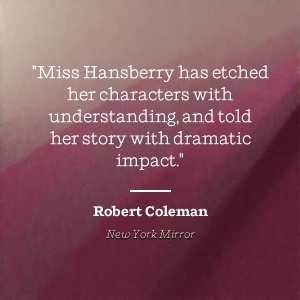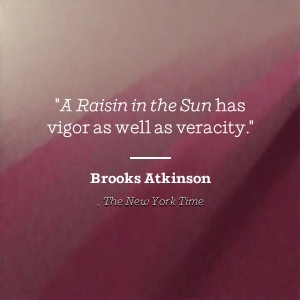Customer Services
Copyright © 2025 Desertcart Holdings Limited
Desert Online General Trading LLC
Dubai, United Arab Emirates


Full description not available



K**R
Wonderful
I have seen the movie several times and the musical version presented by The Black Rep theater in St. Louis a week ago BUT no performance measure up to the power of the written manuscript. Powerful dialogue and exquisite stage directions. Loved it!
M**J
Classic
Lorraine Hansberry's A Raisin in the Sun is a timeless masterpiece, and rereading it as an adult, especially as a Black person, brought a deeper and more personal connection to its themes. When I first read it in high school, I appreciated its powerful story and memorable characters. But now, with more life experience, the play resonates with me on a profound level, reflecting not just a universal struggle for dreams but also the unique challenges faced by Black families in America.The Younger family’s story feels like a reflection of so many real Black families striving for a better life despite systemic racism and societal barriers. Walter Lee’s frustrations and desperate yearning to be seen as a man of worth hit differently now, as I understand the weight of expectations placed on Black men. Lena (Mama) Younger’s unshakable strength and her unwavering hope for her family’s future remind me of the sacrifices and resilience of generations of Black matriarchs. And Beneatha’s search for her identity as a young, educated Black woman mirrors conversations and struggles that remain relevant today.Hansberry captures the nuances of the Black experience with poetic authenticity, from the microaggressions the family faces to the unspoken pressures of representing and uplifting the community. The scene where the Youngers refuse Karl Lindner’s offer to sell their home is an act of defiance that feels deeply personal—a powerful reminder of the dignity and courage it takes to stand firm in the face of racism.Rereading A Raisin in the Sun as an adult reminded me how much of the Black experience is rooted in love, sacrifice, and hope. It’s not just a story of struggle but a celebration of our strength and perseverance. This play remains a cornerstone of Black literature and American theater—a work that evolves with time but always stays true to the core of what it means to dream, to fight, and to rise.
Z**.
Powerful and Engaging
This book is a powerful read. The print quality is good, making it easy for my students to follow along. It covers important issues about race and dreams. The characters feel real, and their struggles hit hard. It’s a complete story that really gets you thinking about the past and present. It sparked great classroom discussions.
J**H
Pioneering African American Drama
I come to this play with the thought that ever since the first slave came to the American Colonies there has always been a Civil Rights struggle. This play is part of its voice, covering perhaps ideas current just after World War II and into the middle 1950's. It is a play full of dreams of empowerment and self-realization for members of one family and for members of all African-American families. It came to the theater prior to the famous "I have a dream" speech given by Dr. Martin Luther King. It is deservedly a milestone in modern American theater. In the space of three acts it's dialog and characterization provides a nuanced and textured look into the race relations I grew up with--even as a 'white boy.' Without taking anything away from this work's power, I believe that the work also reflects the Irish Struggle in pre-Independence, British Colonial times, as expressed by Sean O'Casey in JUNEAU AND THE PAYCOCK. Every culture and time has its special touchstones but for me, O' Casey showed the way and so I give this four rather than five stars. It doesn't help any that I have only seen the contemporary movie versions of the play: they seem to have been hampered by the theatrical conventions of the time. And much that would have seemed so fresh in the mid-fifties provided the basis for works that developed from the Civil Rights era and showcased even stronger African-American characters. This author and the original cast were the pioneers.
M**H
A winner
First off why am I now just reading this glorious play? I must admit within the first couple of pages I was completely sucked in. Lorraine takes a simple family and shows how sexism, racism, and classism, can shape a family for generations. In only 100 + pages I am able to connect to the characters and understand who they are.Walter Lee Jr, is a dreamer, yet very stubborn and emotional.Beneatha mirrors her brother somewhat and is an intellectual who seeks out her place in the world and is not willing to settle.Lena (Mama) the family matriarch is strong willed and tried to maintain her morals and commands respectRuth is the realist and very pessimistic about life but continues to preserve.These characters are very relatable. One part that stood out for me was when Ruth kept telling Walter "eat your eggs" because she didn't want to hear him still selling her a dream. He responded by saying you always crushing my dreams and that black women are the only women who don't hold their men down. I was completely flabbergasted. This stereotype of black women having to be a ride or die and help build you up manifested right there. Another point of contention for me was when Mama wanted to move the family and the white neighbors said they wouldn't be welcomed there. What bothered me the most was how Mr. Linder stated the white people in that community where hardworking and just trying to have a better life. Is that not what the Younger family was trying to do? Even though we don't have Jim Crow laws today, A Raisin in the Sun hold true to it's themes today. This can be read by everyone but I know it will hit home for AA.
Trustpilot
4 days ago
5 days ago